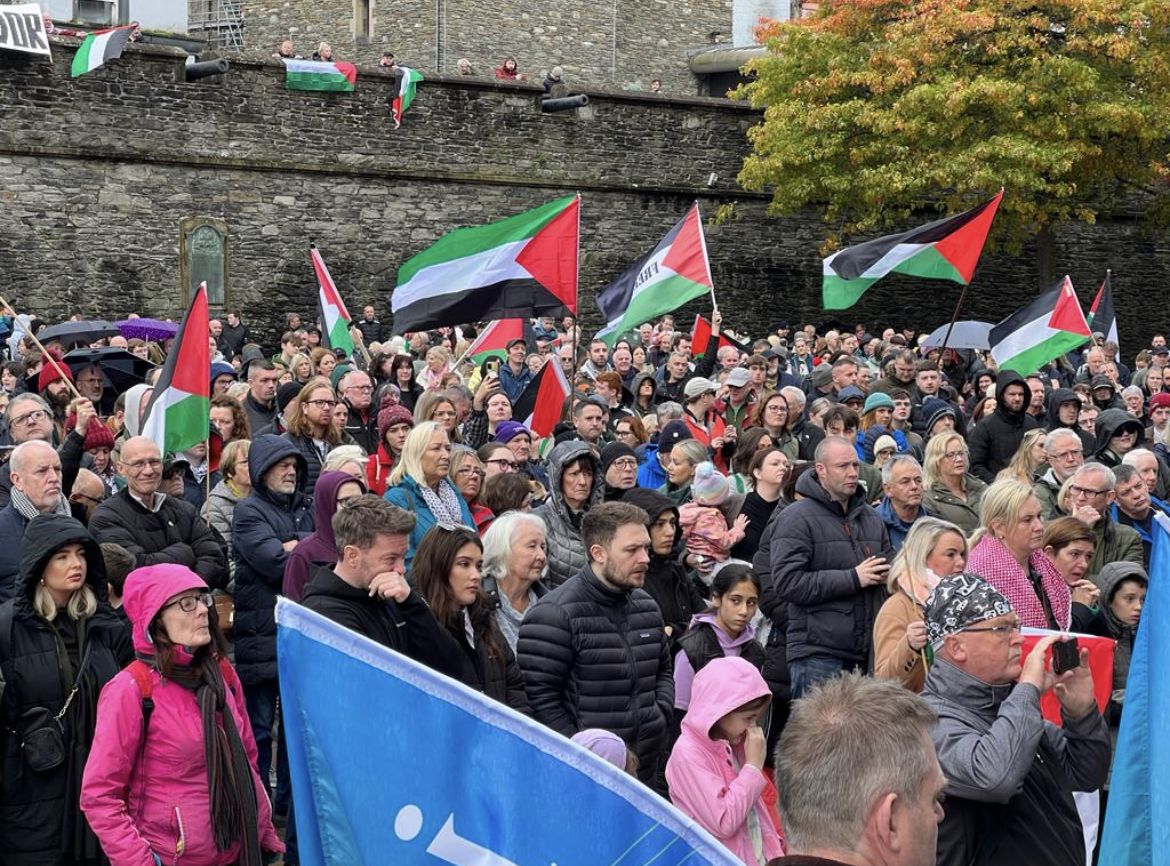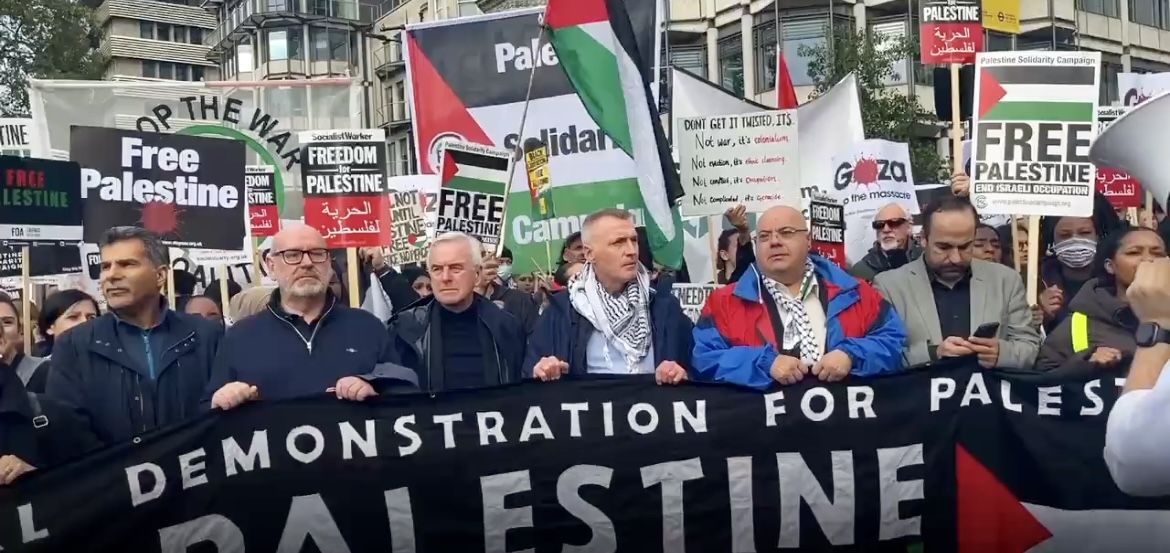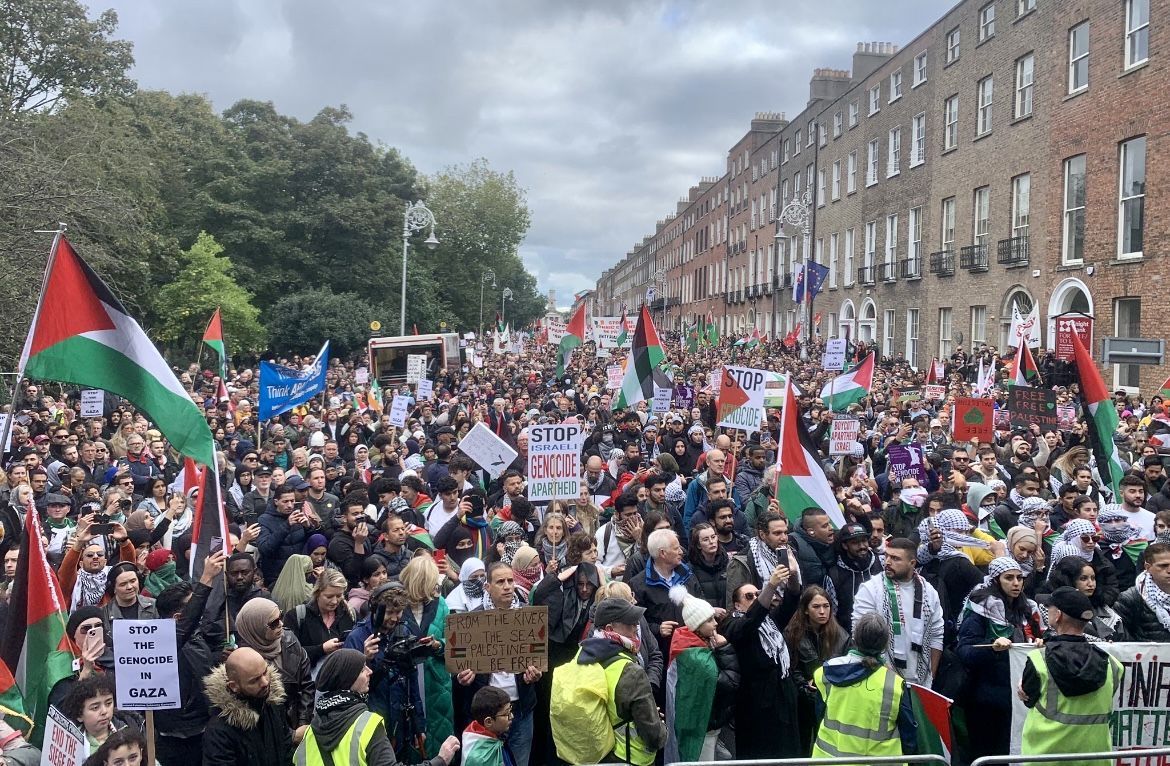As I write this week’s column all of the scéal coming from the Israeli government and its international allies indicate that a ground invasion of Gaza is imminent.
It will, according to some, be a "surgical strike against Hamas." From British government ministers, to political pundits, to international allies of the Israeli government, to Israeli spokespersons, the aim, they say, is to destroy Hamas.
It’s all nonsense of course. The reality is that Israel can no more destroy Hamas than Hamas can destroy Israel.
In addition, the claim that in a military ground invasion of Gaza Israel will be mindful of civilians is also a nonsense. In the past two decades Israeli attacks on and assaults into Gaza, and more recently against Palestinian people in the West Bank, have produced overwhelming evidence of an Israeli apartheid state that views Palestinians as inferior, without rights. They are, according to the Israeli Defence Minister recently, "human animals."
Over the last few weeks almost 100 Palestinians, including at least 30 children, have been shot dead in the West Bank by Israeli snipers. 1300 Palestinians, including many children, have been wounded. As the horrific casualty list from Gaza mounts each day, events on the West Bank are rarely reported.
Even if Israel occupies the rubble of a Gaza City leveled by its scorched earth policy, forcibly evicts or kills those Gazans living in the northern half of that territory, and annexes it as part of a land grab for the greater Israeli state envisioned by Netanyahu, this will all have the opposite effect its strategists are predicting. The history of colonialism is littered with examples of oppressed peoples emerging stronger and more determined in pursuit of their right to self-determination.

If colonialism and our own experience teaches us anything it is that Israeli actions are more likely to embolden opposition to Israeli occupation, not defeat it. Past Israeli actions, the blockade of Gaza for almost twenty years, the flouting of international law and its apartheid policy, have not diminished the Palestinian desire for freedom and justice.
The failure of the international community to stand up for international law and to defend Palestinian rights has led us to this current nightmare.
Moreover, there is now a real danger that the conflict will extend beyond Gaza and the West Bank and embroil the region. It may be several decades since Arab states and Israel have clashed on the battlefield, but concern at Israeli aggression is mounting in the neighboring states. From Lebanon to Jordan to Syria, to non-Arab Iran and Arab Egypt, tensions are rising. There are real risks of a calamitous escalation.
It is still not too late to turn back from the abyss. It will need leadership and courage by all sides and a willingness to take huge personal and political risks for peace. It especially demands that the international community defend the Palestinian people of Gaza and of the West Bank.
The massive solidarity demonstrations last weekend with the Palestinian people in Ireland and around the world can help change the narrative. The increasing numbers of voices demanding a complete cessation by all sides, and an end to the humanitarian catastrophe that is taking place in Gaza, are evidence, too, that there remains a deep well of compassion for all victims.
The demonstration in London.
Declan Kearney, Sinn Féin National Chairperson, addressed the huge march of tens of thousands in London. He said: “A humanitarian catastrophe is taking place in Gaza the likes of which we have never seen. The world has a choice to make. To stand with the oppressed and dispossessed or Palestine, or not. We stand on the side of humanity, decency, universal democracy and international law. We are all Palestinians now.”
The Irish government is in a unique position to demand cessations and to be a voice within the international community for dialogue, ceasefires and a just settlement. The policy of neutrality and military non-alignment has proven invaluable in allowing Irish governments to use the United Nations and other international bodies to win support in defense of human rights.
Uachtarán Michael D. Higgins’ recent assertion that the head of the European Commission, Ursula von der Leyen, was "not speaking for Ireland” when she gave unqualified support for Israel was widely welcomed. His insistence that the international community “retain and insist on the veracity and cogency of international law” was also supported. His remarks underline the importance of Irish neutrality. It must not be eroded or undermined.
Following the Russian invasion of Ukraine there was anger last year at comments by Micheál Martin that suggested that the Fianna Fáil/Fine Gael/Green Party government was moving away from neutrality. Martin said: “We need to reflect on military non-alignment in Ireland and our military neutrality.” His claim that “We don’t need a referendum to join NATO. That’s a policy decision of government” was challenged and criticized.
The crisis in the Middle East and the illegal and brutal assault on the people of Gaza reinforce the imperative of the policy of neutrality.
By remaining neutral and non-aligned to military alliances the Irish government has the opportunity to build on the state’s positive contributions in the United Nations and to its peacekeeping role. Ireland is known for our work on peacebuilding and the protection of human rights and fundamental freedoms. Irish neutrality has served the island of Ireland well and is generally welcomed by the majority of states within the UN. This is evidenced by the support it received several years ago to join the UN Security Council.
Through diplomacy, humanitarianism, peace-building and co-operation, we have the ability to make a real difference in international matters and to play an important role in an increasingly dangerous world. By investing in conflict resolution rather than conflict participation the Irish government can make a solid, positive contribution to de-escalating the language of war, sectarianism and racism.
Neutrality is not being isolationist. It is not about indifference. It’s not about turning our backs on the world. As the International Committee of the Red Cross said two days ago, neutrality is a way of helping that allows “us to reach those who need it most.”
That means condemning those who breach international law – whether it is Hamas or Israel – and standing up for and with an impoverished, imprisoned Palestinian people living under the brutal rule of apartheid. Silence in this dark time is complicity in the genocide of the people of Gaza.
PEACEMAKERS
Thirtyyears ago on Monday an IRA bomb exploded on the Shankill Road killing nine people and IRA Volunteer Thomas Begley. It was a shocking event compounded a week later when eight people were shot dead in Greysteel. These were two of many atrocities which occurred during a quarter century of conflict in the North. Their impact on families and communities reverberates still today, as do the more than 3,000 other deaths and the thousands of injuries that resulted from those desperate years. The families of the dead and the injured have lived with the consequences ever since.
Today we are in a much better place, not least because many of those who suffered directly from the violence became peacemakers. Citizens willing to step beyond their own personal tragedies and provide support and comfort to the bereaved and injured and to become advocates for peace and for justice.
We are mindful of their loss and grateful for their courage and dedication in breaking down barriers. Alan McBride - who lost his wife Sharon and her father Desmond in the IRA bomb - is one such person. He is an example to the rest of us, including this columnist.
Tír Chonaill Thuaidh (North Donegal)
Bhuail mé le spéirbhean
Ar bharr portaigh
I measc na sléibhte
I dTír Chonaill Thuaidh.
Thug sí a lamh dom
Ar bharr portaigh
I measc na sléibhte
I dTír Chonaill Thuaidh.
Thug mé póg di
Ar bharr portaigh
I measc na sléibhte
I dTír Chonaill Thuaidh.
Fan anseo liom,
Arsa an spéirbhean
Ar bharr portaigh
I measc na sléibhte
I dTír Chonaill Thuaidh.









